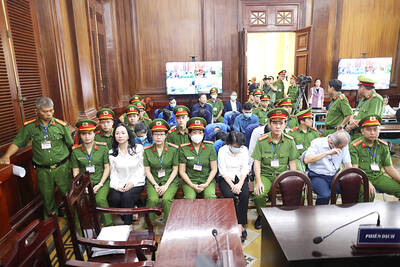North Korea launched eight ballistic missiles from multiple locations yesterday, the South Korean military said, a day after Seoul and Washington completed their first joint drills involving a US aircraft carrier in more than four years.
Pyongyang has doubled down on upgrading its weapons program this year, despite facing crippling economic sanctions, with officials and analysts warning that the regime is preparing to carry out a fresh nuclear test.
“Our military detected eight short-range ballistic missiles fired by North Korea,” the South Korean Joint Chiefs of Staff said.
The missiles were launched from multiple locations over a 30-minute period, including the capital, Pyongyang, Tongchang-ri in North Pyongan Province and Hamhung in South Hamgyong Province, they said.
They traveled distances ranging from 110km to 670km, and flew at different altitudes of up to 90km, they added.
The simultaneous test-firing from multiple locations was “unusual,” Japanese Minister of Defense Nobuo Kishi said, adding that it was “absolutely unacceptable.”
According to local reports, two missiles were shot from each site, likely from transporter erector launchers, and formed the largest number of ballistic missiles North Korea has launched on a single day and occasion.
The volley of missile launches — one of nearly 20 weapons tests by Pyongyang so far this year — is a pointed message for Seoul and Washington, analysts said.
“It shows North Korea’s intention to neutralize the missile defense system of South Korea and the United States with multiple simultaneous attacks during emergency,” said Sejong Institute researcher Cheong Seong-jang.
The move comes barely a day after South Korea and the US wrapped up large-scale, three-day exercises involving the USS Ronald Reagan, a 100,000-tonne nuclear-powered aircraft carrier.
The exercises were the allies’ first joint military drills since South Korean President Yoon Suk-yeol took office last month, and the first involving an aircraft carrier since November 2017.
Pyongyang has long protested against the joint exercises, calling them rehearsals for invasion.
“The exercise consolidated the two countries’ determination to sternly respond to any North Korean provocations while demonstrating the US commitment to provide extended deterrence,” the South Korean joint chiefs said in a statement.
Yesterday’s launches were likely a response to the US-South Korea maneuvers, Asan Institute for Policy Studies researcher Go Myong-hyun said.
“It seems that they fired eight missiles, because the scale of the joint drills has expanded in their view,” he said.
During a summit last month with Yoon, US President Joe Biden said Washington would deploy “strategic assets” to South Korea if necessary, as part of efforts to bolster deterrence.
Pyongyang test-fired three missiles, including possibly its largest intercontinental ballistic missile, the Hwasong-17, just days after Biden left South Korea following his summit with Yoon.
US and South Korean officials have warned for weeks that Pyongyang could conduct a seventh nuclear test.
A US bid last month to impose fresh UN sanctions on Pyongyang over its missile launches was vetoed by Russia and China.
Despite struggling with a recent COVID-19 outbreak, North Korea has resumed construction on a long-dormant nuclear reactor, new satellite imagery showed.
The South Korean presidential office last month said that Pyongyang had carried out tests of a nuclear detonation device in preparation for its first nuclear test since 2017.
Long-range and nuclear tests have been paused since North Korean leader Kim Jong-un met then-US president Donald Trump for a bout of high-profile negotiations that collapsed in 2019.
However, Pyongyang has since abandoned this self-imposed moratorium, conducting a blitz of sanctions-busting weapons tests this year, including firing an intercontinental ballistic missile at full range.
Analysts have warned that Kim could speed up nuclear testing plans to distract North Koreans from the disastrous COVID-19 outbreak.

Republican US lawmakers on Friday criticized US President Joe Biden’s administration after sanctioned Chinese telecoms equipment giant Huawei unveiled a laptop this week powered by an Intel artificial intelligence (AI) chip. The US placed Huawei on a trade restriction list in 2019 for contravening Iran sanctions, part of a broader effort to hobble Beijing’s technological advances. Placement on the list means the company’s suppliers have to seek a special, difficult-to-obtain license before shipping to it. One such license, issued by then-US president Donald Trump’s administration, has allowed Intel to ship central processors to Huawei for use in laptops since 2020. China hardliners

A top Vietnamese property tycoon was on Thursday sentenced to death in one of the biggest corruption cases in history, with an estimated US$27 billion in damages. A panel of three hand-picked jurors and two judges rejected all defense arguments by Truong My Lan, chair of major developer Van Thinh Phat, who was found guilty of swindling cash from Saigon Commercial Bank (SCB) over a decade. “The defendant’s actions ... eroded people’s trust in the leadership of the [Communist] Party and state,” read the verdict at the trial in Ho Chi Minh City. After the five-week trial, 85 others were also sentenced on

Conjoined twins Lori and George Schappell, who pursued separate careers, interests and relationships during lives that defied medical expectations, died this month in Pennsylvania, funeral home officials said. They were 62. The twins, listed by Guinness World Records as the oldest living conjoined twins, died on April 7 at the Hospital of the University of Pennsylvania, obituaries posted by Leibensperger Funeral Homes of Hamburg said. The cause of death was not detailed. “When we were born, the doctors didn’t think we’d make 30, but we proved them wrong,” Lori said in an interview when they turned 50, the Philadelphia Inquirer reported. The

RAMPAGE: A Palestinian man was left dead after dozens of Israeli settlers searching for a missing 14-year-old boy stormed a village in the Israeli-occupied West Bank US President Joe Biden on Friday said he expected Iran to attack Israel “sooner, rather than later” and warned Tehran not to proceed. Asked by reporters about his message to Iran, Biden simply said: “Don’t,” underscoring Washington’s commitment to defend Israel. “We are devoted to the defense of Israel. We will support Israel. We will help defend Israel and Iran will not succeed,” he said. Biden said he would not divulge secure information, but said his expectation was that an attack could come “sooner, rather than later.” Israel braced on Friday for an attack by Iran or its proxies as warnings grew of